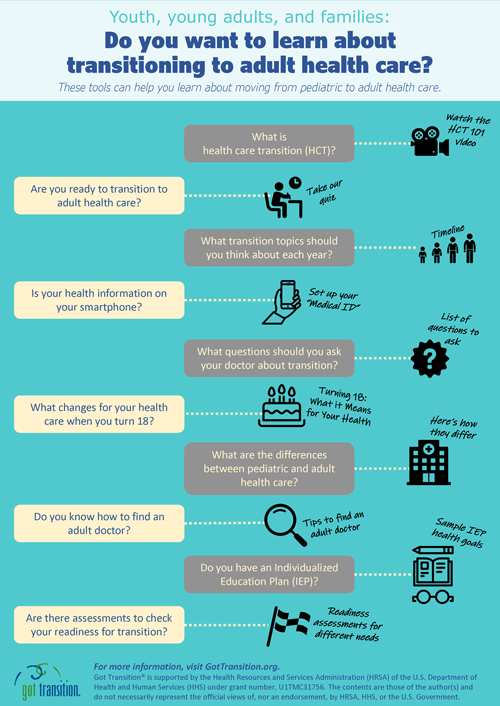Navigating Medical Transitions
The transition from pediatric to adult health care has been identified as one of the top challenges for children with special health care needs and their families who live in West Virginia. It is important to make a plan as your child approaches age 18 to ensure a smooth transition to adult providers.
We spoke to West Virginians with disabilities, family members and providers about their experiences with medical transitions from pediatric care to adulthood. The video below features some of their valuable insights and advice.
Navigating Medical Transitions from Pediatric to Adulthood mini-documentary
Questions to ask your doctor about transitioning to adult health care (provided by Got Transition):
ECHO Series: Navigating Medical Transitions into Adulthood
The WVU CED was funded by the West Virginia Developmental Disabilities Council through the WV Department of Health and Human Resources to create a six-session ECHO Series on navigating medical transitions from pediatric to adult health care.
This six session training online series is intended to provide education and resources to individuals, families and healthcare professionals about navigating medical care transitions from pediatrics to adult care.
These sessions are intended for individuals with disabilities, families/caretakers and professionals who work with individuals with disabilities and/or special health care needs.
| Topic: | Presenter: |
|---|---|
| Family Experiences Navigating Medical Transition of Care from Pediatrics to Adulthood | Brandy Brown, PhD, OTD, MOT, BA, OTR/L Melina Danko, MS |
| Engaging Youth in their Medical Care | Maggie Jaynes, MD |
| Alternatives to Guardianship and Supported Decision-Making Options | Christina Smith |
| Tips and Tools for Medical Transition of Care | Lesley Cottrell, PhD |
| Pediatric and Adult Differences in Primary and Specialty Medical Care | Treah Haggerty, MD Maggie Jaynes, MD |
| Transitioning Youth with Complex Medical Needs | David Thomas, MD |
CEUs are no longer available for the webinars, but you can view them at any time. Click the topics above to watch individual sessions, or select the button below to view the whole series:
Additional Resources
- Got Transition: The federally funded national resource center on health care transition (HCT). Its aim is to improve the transition from pediatric to adult health care using evidence-driven strategies for clinicians and other health care professionals; public health programs; payers and plans; youth and young adults; and parents and caregivers.
- Center for Transition to Adult Health Care for Youth with Disabilities: A national health care transition resource center with the goal of empowering youth and young adults with intellectual and developmental disabilities ages 12-26 to direct their own transition from pediatric to adult care with no reduction in quality of care and no gaps in service.
- Tips for Preparing for your Move to Adult Health Care: This document made by Got Transition outlines the difference between pediatric and adult health care. It also includes some helpful tips to help prepare for the move to adult health care.
- My Health Care Visit: A form for people with intellectual and/or developmental disabilities to prepare for a visit with a health care professional. It can be completed with the clinician to better understand the purpose and outcome of the visit.
- About My Health Worksheet: A different worksheet for people with intellectual and/or developmental disabilities to help make health care visits successful. It asks about likes, dislikes, communication preferences and more.
- Health Care Transitions Checklist and Plan: The transition checklist helps prepare families and youth for discussions with providers to help make transitions successful. The transition plan helps providers set goals for transitioning a patient and their family.
- My Hospital Form: This form helps hospital staff know how to best accommodate medical and communication needs in a situation when they may need to go to the hospital while their family and support are unavailable.
- Decision-Making in Health Care: A tool to help health care providers respect the decision-making rights of people with intellectual and/or developmental disabilities.
- Person-Centered Health Profile Workbook: A workbook that can be completed by an individual with special health care needs and their chosen health partner to be used at visits with providers to help them understand communication and decision-making preferences.

